Annotated Bibliographies in Blockchain on Healthcare
VerifiedAdded on 2022/11/18
|12
|3096
|254
AI Summary
This article presents annotated bibliographies on the potential of blockchain technology in healthcare. It explores how blockchain can transform health care, provide secure patient data, and enhance supply chain management. The bibliographies cover topics such as smart contracts for remote patient monitoring, geospatial blockchain, and software patterns for healthcare interoperability.
Contribute Materials
Your contribution can guide someone’s learning journey. Share your
documents today.
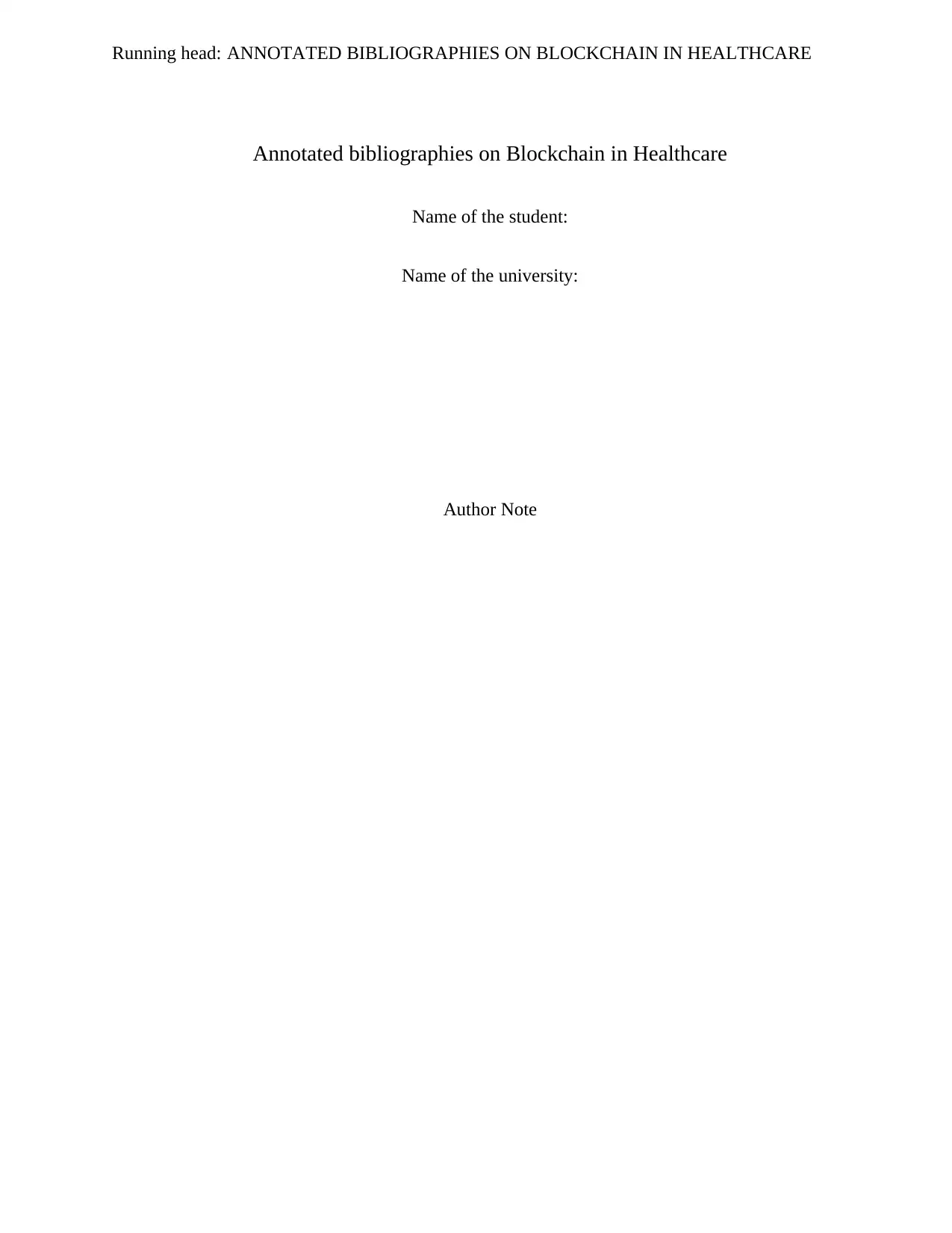
Running head: ANNOTATED BIBLIOGRAPHIES ON BLOCKCHAIN IN HEALTHCARE
Annotated bibliographies on Blockchain in Healthcare
Name of the student:
Name of the university:
Author Note
Annotated bibliographies on Blockchain in Healthcare
Name of the student:
Name of the university:
Author Note
Secure Best Marks with AI Grader
Need help grading? Try our AI Grader for instant feedback on your assignments.
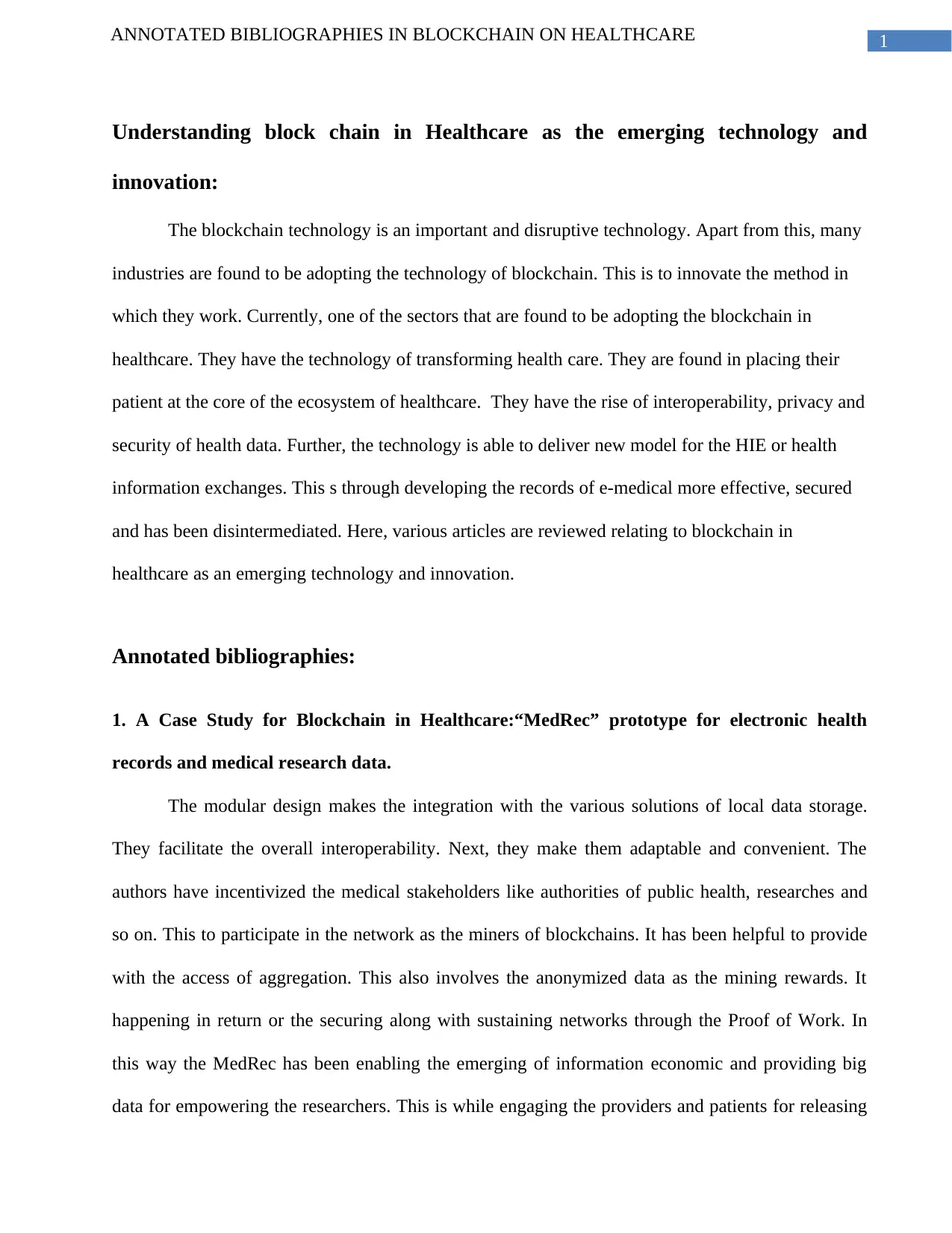
1ANNOTATED BIBLIOGRAPHIES IN BLOCKCHAIN ON HEALTHCARE
Understanding block chain in Healthcare as the emerging technology and
innovation:
The blockchain technology is an important and disruptive technology. Apart from this, many
industries are found to be adopting the technology of blockchain. This is to innovate the method in
which they work. Currently, one of the sectors that are found to be adopting the blockchain in
healthcare. They have the technology of transforming health care. They are found in placing their
patient at the core of the ecosystem of healthcare. They have the rise of interoperability, privacy and
security of health data. Further, the technology is able to deliver new model for the HIE or health
information exchanges. This s through developing the records of e-medical more effective, secured
and has been disintermediated. Here, various articles are reviewed relating to blockchain in
healthcare as an emerging technology and innovation.
Annotated bibliographies:
1. A Case Study for Blockchain in Healthcare:“MedRec” prototype for electronic health
records and medical research data.
The modular design makes the integration with the various solutions of local data storage.
They facilitate the overall interoperability. Next, they make them adaptable and convenient. The
authors have incentivized the medical stakeholders like authorities of public health, researches and
so on. This to participate in the network as the miners of blockchains. It has been helpful to provide
with the access of aggregation. This also involves the anonymized data as the mining rewards. It
happening in return or the securing along with sustaining networks through the Proof of Work. In
this way the MedRec has been enabling the emerging of information economic and providing big
data for empowering the researchers. This is while engaging the providers and patients for releasing
Understanding block chain in Healthcare as the emerging technology and
innovation:
The blockchain technology is an important and disruptive technology. Apart from this, many
industries are found to be adopting the technology of blockchain. This is to innovate the method in
which they work. Currently, one of the sectors that are found to be adopting the blockchain in
healthcare. They have the technology of transforming health care. They are found in placing their
patient at the core of the ecosystem of healthcare. They have the rise of interoperability, privacy and
security of health data. Further, the technology is able to deliver new model for the HIE or health
information exchanges. This s through developing the records of e-medical more effective, secured
and has been disintermediated. Here, various articles are reviewed relating to blockchain in
healthcare as an emerging technology and innovation.
Annotated bibliographies:
1. A Case Study for Blockchain in Healthcare:“MedRec” prototype for electronic health
records and medical research data.
The modular design makes the integration with the various solutions of local data storage.
They facilitate the overall interoperability. Next, they make them adaptable and convenient. The
authors have incentivized the medical stakeholders like authorities of public health, researches and
so on. This to participate in the network as the miners of blockchains. It has been helpful to provide
with the access of aggregation. This also involves the anonymized data as the mining rewards. It
happening in return or the securing along with sustaining networks through the Proof of Work. In
this way the MedRec has been enabling the emerging of information economic and providing big
data for empowering the researchers. This is while engaging the providers and patients for releasing
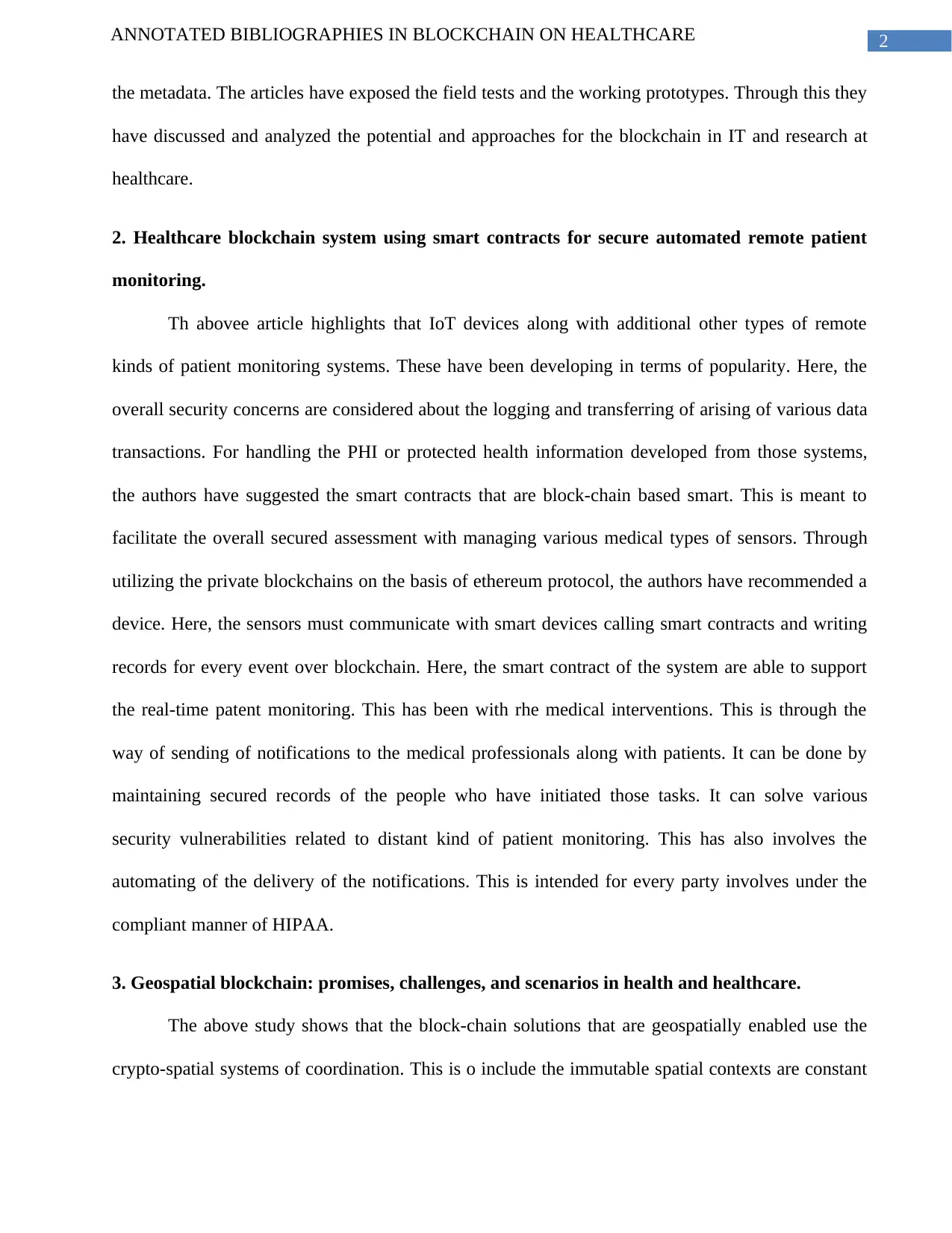
2ANNOTATED BIBLIOGRAPHIES IN BLOCKCHAIN ON HEALTHCARE
the metadata. The articles have exposed the field tests and the working prototypes. Through this they
have discussed and analyzed the potential and approaches for the blockchain in IT and research at
healthcare.
2. Healthcare blockchain system using smart contracts for secure automated remote patient
monitoring.
Th abovee article highlights that IoT devices along with additional other types of remote
kinds of patient monitoring systems. These have been developing in terms of popularity. Here, the
overall security concerns are considered about the logging and transferring of arising of various data
transactions. For handling the PHI or protected health information developed from those systems,
the authors have suggested the smart contracts that are block-chain based smart. This is meant to
facilitate the overall secured assessment with managing various medical types of sensors. Through
utilizing the private blockchains on the basis of ethereum protocol, the authors have recommended a
device. Here, the sensors must communicate with smart devices calling smart contracts and writing
records for every event over blockchain. Here, the smart contract of the system are able to support
the real-time patent monitoring. This has been with rhe medical interventions. This is through the
way of sending of notifications to the medical professionals along with patients. It can be done by
maintaining secured records of the people who have initiated those tasks. It can solve various
security vulnerabilities related to distant kind of patient monitoring. This has also involves the
automating of the delivery of the notifications. This is intended for every party involves under the
compliant manner of HIPAA.
3. Geospatial blockchain: promises, challenges, and scenarios in health and healthcare.
The above study shows that the block-chain solutions that are geospatially enabled use the
crypto-spatial systems of coordination. This is o include the immutable spatial contexts are constant
the metadata. The articles have exposed the field tests and the working prototypes. Through this they
have discussed and analyzed the potential and approaches for the blockchain in IT and research at
healthcare.
2. Healthcare blockchain system using smart contracts for secure automated remote patient
monitoring.
Th abovee article highlights that IoT devices along with additional other types of remote
kinds of patient monitoring systems. These have been developing in terms of popularity. Here, the
overall security concerns are considered about the logging and transferring of arising of various data
transactions. For handling the PHI or protected health information developed from those systems,
the authors have suggested the smart contracts that are block-chain based smart. This is meant to
facilitate the overall secured assessment with managing various medical types of sensors. Through
utilizing the private blockchains on the basis of ethereum protocol, the authors have recommended a
device. Here, the sensors must communicate with smart devices calling smart contracts and writing
records for every event over blockchain. Here, the smart contract of the system are able to support
the real-time patent monitoring. This has been with rhe medical interventions. This is through the
way of sending of notifications to the medical professionals along with patients. It can be done by
maintaining secured records of the people who have initiated those tasks. It can solve various
security vulnerabilities related to distant kind of patient monitoring. This has also involves the
automating of the delivery of the notifications. This is intended for every party involves under the
compliant manner of HIPAA.
3. Geospatial blockchain: promises, challenges, and scenarios in health and healthcare.
The above study shows that the block-chain solutions that are geospatially enabled use the
crypto-spatial systems of coordination. This is o include the immutable spatial contexts are constant
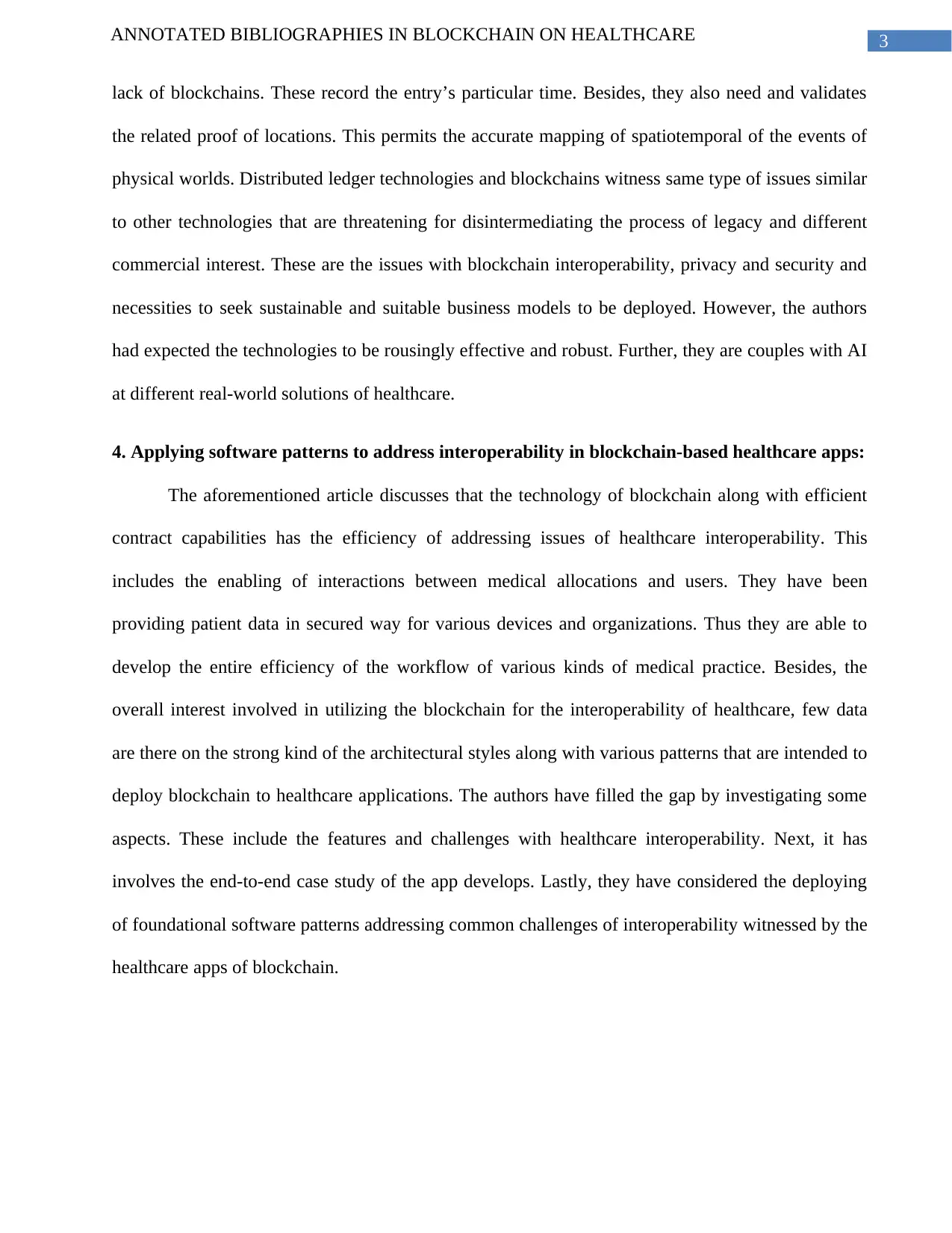
3ANNOTATED BIBLIOGRAPHIES IN BLOCKCHAIN ON HEALTHCARE
lack of blockchains. These record the entry’s particular time. Besides, they also need and validates
the related proof of locations. This permits the accurate mapping of spatiotemporal of the events of
physical worlds. Distributed ledger technologies and blockchains witness same type of issues similar
to other technologies that are threatening for disintermediating the process of legacy and different
commercial interest. These are the issues with blockchain interoperability, privacy and security and
necessities to seek sustainable and suitable business models to be deployed. However, the authors
had expected the technologies to be rousingly effective and robust. Further, they are couples with AI
at different real-world solutions of healthcare.
4. Applying software patterns to address interoperability in blockchain-based healthcare apps:
The aforementioned article discusses that the technology of blockchain along with efficient
contract capabilities has the efficiency of addressing issues of healthcare interoperability. This
includes the enabling of interactions between medical allocations and users. They have been
providing patient data in secured way for various devices and organizations. Thus they are able to
develop the entire efficiency of the workflow of various kinds of medical practice. Besides, the
overall interest involved in utilizing the blockchain for the interoperability of healthcare, few data
are there on the strong kind of the architectural styles along with various patterns that are intended to
deploy blockchain to healthcare applications. The authors have filled the gap by investigating some
aspects. These include the features and challenges with healthcare interoperability. Next, it has
involves the end-to-end case study of the app develops. Lastly, they have considered the deploying
of foundational software patterns addressing common challenges of interoperability witnessed by the
healthcare apps of blockchain.
lack of blockchains. These record the entry’s particular time. Besides, they also need and validates
the related proof of locations. This permits the accurate mapping of spatiotemporal of the events of
physical worlds. Distributed ledger technologies and blockchains witness same type of issues similar
to other technologies that are threatening for disintermediating the process of legacy and different
commercial interest. These are the issues with blockchain interoperability, privacy and security and
necessities to seek sustainable and suitable business models to be deployed. However, the authors
had expected the technologies to be rousingly effective and robust. Further, they are couples with AI
at different real-world solutions of healthcare.
4. Applying software patterns to address interoperability in blockchain-based healthcare apps:
The aforementioned article discusses that the technology of blockchain along with efficient
contract capabilities has the efficiency of addressing issues of healthcare interoperability. This
includes the enabling of interactions between medical allocations and users. They have been
providing patient data in secured way for various devices and organizations. Thus they are able to
develop the entire efficiency of the workflow of various kinds of medical practice. Besides, the
overall interest involved in utilizing the blockchain for the interoperability of healthcare, few data
are there on the strong kind of the architectural styles along with various patterns that are intended to
deploy blockchain to healthcare applications. The authors have filled the gap by investigating some
aspects. These include the features and challenges with healthcare interoperability. Next, it has
involves the end-to-end case study of the app develops. Lastly, they have considered the deploying
of foundational software patterns addressing common challenges of interoperability witnessed by the
healthcare apps of blockchain.
Paraphrase This Document
Need a fresh take? Get an instant paraphrase of this document with our AI Paraphraser
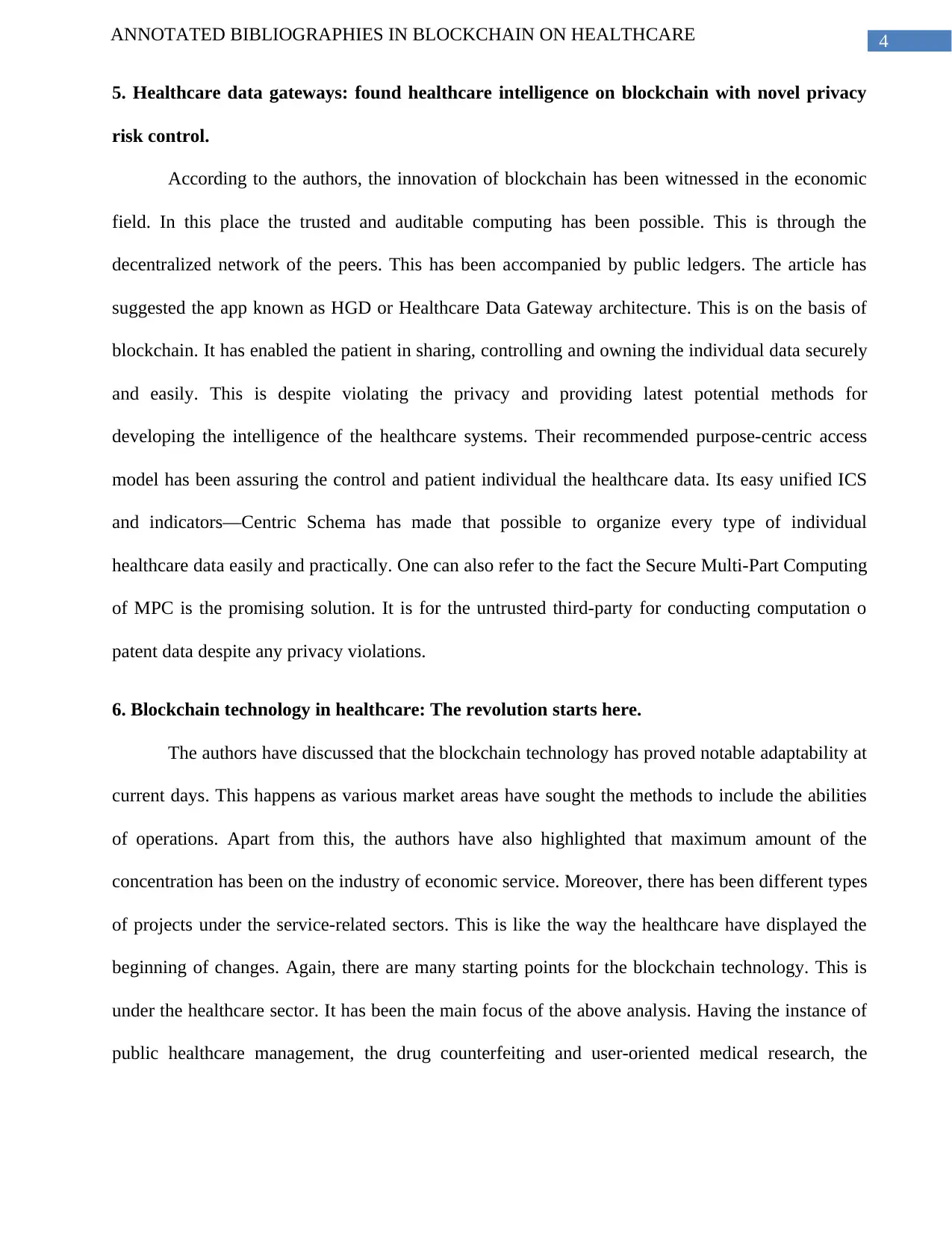
4ANNOTATED BIBLIOGRAPHIES IN BLOCKCHAIN ON HEALTHCARE
5. Healthcare data gateways: found healthcare intelligence on blockchain with novel privacy
risk control.
According to the authors, the innovation of blockchain has been witnessed in the economic
field. In this place the trusted and auditable computing has been possible. This is through the
decentralized network of the peers. This has been accompanied by public ledgers. The article has
suggested the app known as HGD or Healthcare Data Gateway architecture. This is on the basis of
blockchain. It has enabled the patient in sharing, controlling and owning the individual data securely
and easily. This is despite violating the privacy and providing latest potential methods for
developing the intelligence of the healthcare systems. Their recommended purpose-centric access
model has been assuring the control and patient individual the healthcare data. Its easy unified ICS
and indicators—Centric Schema has made that possible to organize every type of individual
healthcare data easily and practically. One can also refer to the fact the Secure Multi-Part Computing
of MPC is the promising solution. It is for the untrusted third-party for conducting computation o
patent data despite any privacy violations.
6. Blockchain technology in healthcare: The revolution starts here.
The authors have discussed that the blockchain technology has proved notable adaptability at
current days. This happens as various market areas have sought the methods to include the abilities
of operations. Apart from this, the authors have also highlighted that maximum amount of the
concentration has been on the industry of economic service. Moreover, there has been different types
of projects under the service-related sectors. This is like the way the healthcare have displayed the
beginning of changes. Again, there are many starting points for the blockchain technology. This is
under the healthcare sector. It has been the main focus of the above analysis. Having the instance of
public healthcare management, the drug counterfeiting and user-oriented medical research, the
5. Healthcare data gateways: found healthcare intelligence on blockchain with novel privacy
risk control.
According to the authors, the innovation of blockchain has been witnessed in the economic
field. In this place the trusted and auditable computing has been possible. This is through the
decentralized network of the peers. This has been accompanied by public ledgers. The article has
suggested the app known as HGD or Healthcare Data Gateway architecture. This is on the basis of
blockchain. It has enabled the patient in sharing, controlling and owning the individual data securely
and easily. This is despite violating the privacy and providing latest potential methods for
developing the intelligence of the healthcare systems. Their recommended purpose-centric access
model has been assuring the control and patient individual the healthcare data. Its easy unified ICS
and indicators—Centric Schema has made that possible to organize every type of individual
healthcare data easily and practically. One can also refer to the fact the Secure Multi-Part Computing
of MPC is the promising solution. It is for the untrusted third-party for conducting computation o
patent data despite any privacy violations.
6. Blockchain technology in healthcare: The revolution starts here.
The authors have discussed that the blockchain technology has proved notable adaptability at
current days. This happens as various market areas have sought the methods to include the abilities
of operations. Apart from this, the authors have also highlighted that maximum amount of the
concentration has been on the industry of economic service. Moreover, there has been different types
of projects under the service-related sectors. This is like the way the healthcare have displayed the
beginning of changes. Again, there are many starting points for the blockchain technology. This is
under the healthcare sector. It has been the main focus of the above analysis. Having the instance of
public healthcare management, the drug counterfeiting and user-oriented medical research, the
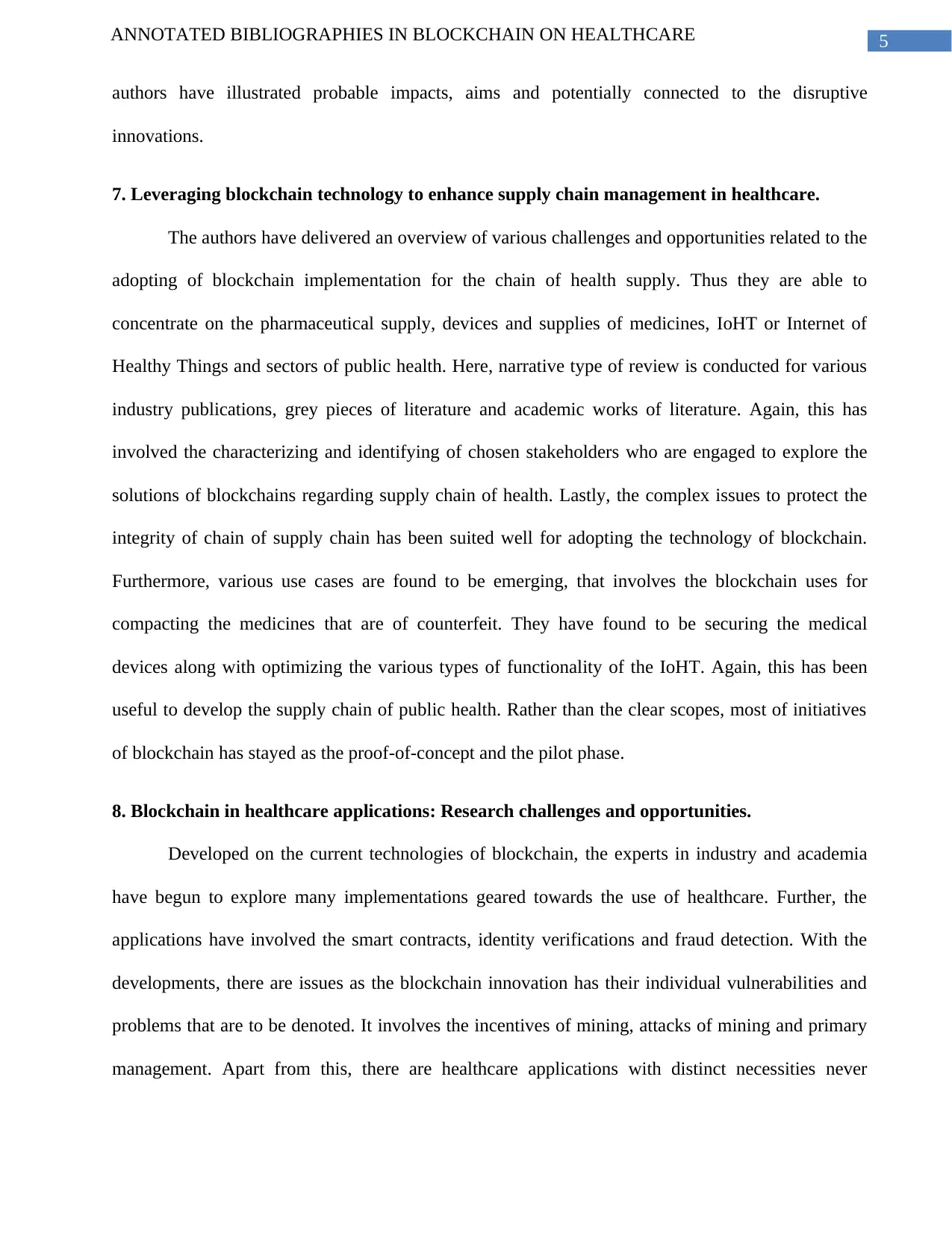
5ANNOTATED BIBLIOGRAPHIES IN BLOCKCHAIN ON HEALTHCARE
authors have illustrated probable impacts, aims and potentially connected to the disruptive
innovations.
7. Leveraging blockchain technology to enhance supply chain management in healthcare.
The authors have delivered an overview of various challenges and opportunities related to the
adopting of blockchain implementation for the chain of health supply. Thus they are able to
concentrate on the pharmaceutical supply, devices and supplies of medicines, IoHT or Internet of
Healthy Things and sectors of public health. Here, narrative type of review is conducted for various
industry publications, grey pieces of literature and academic works of literature. Again, this has
involved the characterizing and identifying of chosen stakeholders who are engaged to explore the
solutions of blockchains regarding supply chain of health. Lastly, the complex issues to protect the
integrity of chain of supply chain has been suited well for adopting the technology of blockchain.
Furthermore, various use cases are found to be emerging, that involves the blockchain uses for
compacting the medicines that are of counterfeit. They have found to be securing the medical
devices along with optimizing the various types of functionality of the IoHT. Again, this has been
useful to develop the supply chain of public health. Rather than the clear scopes, most of initiatives
of blockchain has stayed as the proof-of-concept and the pilot phase.
8. Blockchain in healthcare applications: Research challenges and opportunities.
Developed on the current technologies of blockchain, the experts in industry and academia
have begun to explore many implementations geared towards the use of healthcare. Further, the
applications have involved the smart contracts, identity verifications and fraud detection. With the
developments, there are issues as the blockchain innovation has their individual vulnerabilities and
problems that are to be denoted. It involves the incentives of mining, attacks of mining and primary
management. Apart from this, there are healthcare applications with distinct necessities never
authors have illustrated probable impacts, aims and potentially connected to the disruptive
innovations.
7. Leveraging blockchain technology to enhance supply chain management in healthcare.
The authors have delivered an overview of various challenges and opportunities related to the
adopting of blockchain implementation for the chain of health supply. Thus they are able to
concentrate on the pharmaceutical supply, devices and supplies of medicines, IoHT or Internet of
Healthy Things and sectors of public health. Here, narrative type of review is conducted for various
industry publications, grey pieces of literature and academic works of literature. Again, this has
involved the characterizing and identifying of chosen stakeholders who are engaged to explore the
solutions of blockchains regarding supply chain of health. Lastly, the complex issues to protect the
integrity of chain of supply chain has been suited well for adopting the technology of blockchain.
Furthermore, various use cases are found to be emerging, that involves the blockchain uses for
compacting the medicines that are of counterfeit. They have found to be securing the medical
devices along with optimizing the various types of functionality of the IoHT. Again, this has been
useful to develop the supply chain of public health. Rather than the clear scopes, most of initiatives
of blockchain has stayed as the proof-of-concept and the pilot phase.
8. Blockchain in healthcare applications: Research challenges and opportunities.
Developed on the current technologies of blockchain, the experts in industry and academia
have begun to explore many implementations geared towards the use of healthcare. Further, the
applications have involved the smart contracts, identity verifications and fraud detection. With the
developments, there are issues as the blockchain innovation has their individual vulnerabilities and
problems that are to be denoted. It involves the incentives of mining, attacks of mining and primary
management. Apart from this, there are healthcare applications with distinct necessities never
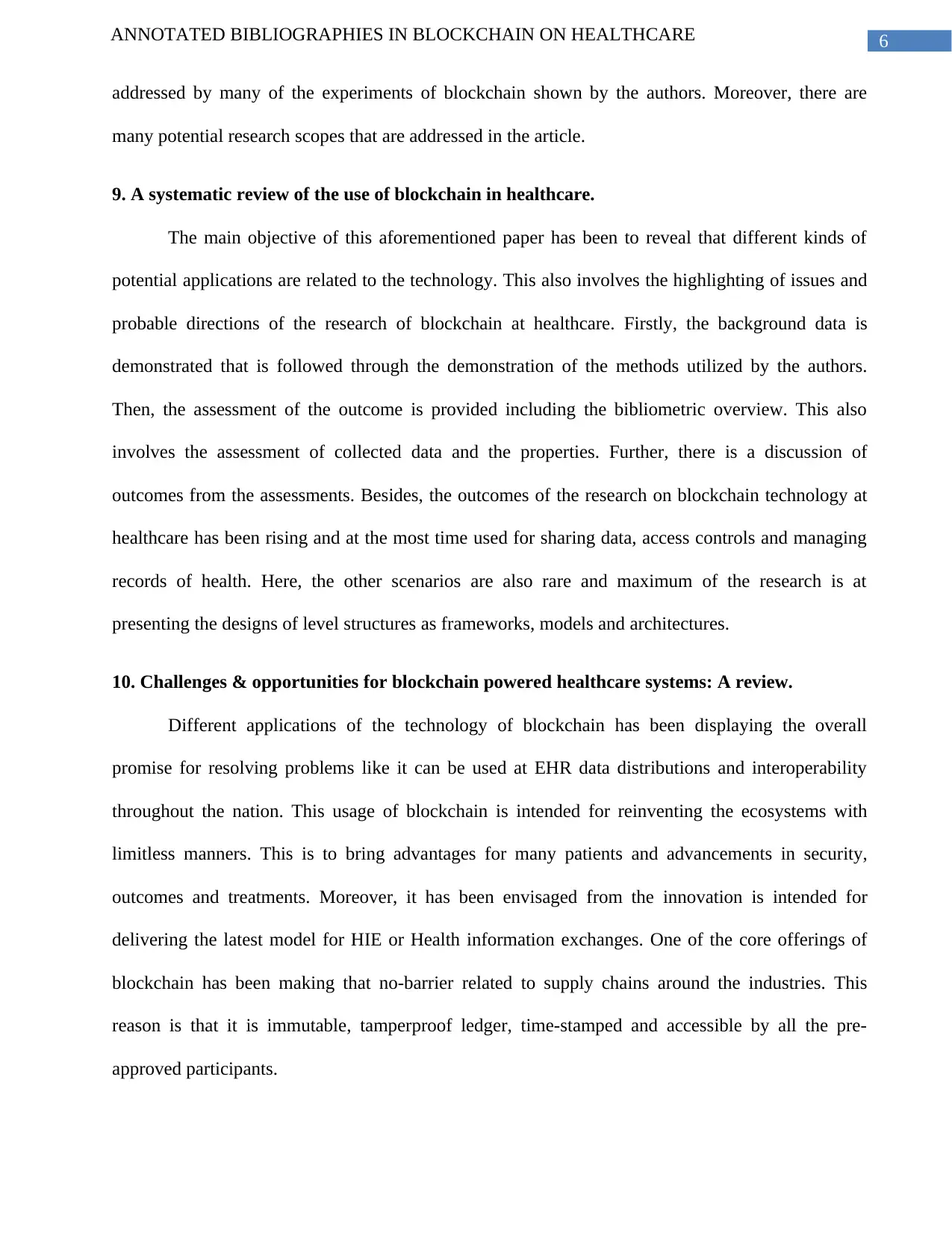
6ANNOTATED BIBLIOGRAPHIES IN BLOCKCHAIN ON HEALTHCARE
addressed by many of the experiments of blockchain shown by the authors. Moreover, there are
many potential research scopes that are addressed in the article.
9. A systematic review of the use of blockchain in healthcare.
The main objective of this aforementioned paper has been to reveal that different kinds of
potential applications are related to the technology. This also involves the highlighting of issues and
probable directions of the research of blockchain at healthcare. Firstly, the background data is
demonstrated that is followed through the demonstration of the methods utilized by the authors.
Then, the assessment of the outcome is provided including the bibliometric overview. This also
involves the assessment of collected data and the properties. Further, there is a discussion of
outcomes from the assessments. Besides, the outcomes of the research on blockchain technology at
healthcare has been rising and at the most time used for sharing data, access controls and managing
records of health. Here, the other scenarios are also rare and maximum of the research is at
presenting the designs of level structures as frameworks, models and architectures.
10. Challenges & opportunities for blockchain powered healthcare systems: A review.
Different applications of the technology of blockchain has been displaying the overall
promise for resolving problems like it can be used at EHR data distributions and interoperability
throughout the nation. This usage of blockchain is intended for reinventing the ecosystems with
limitless manners. This is to bring advantages for many patients and advancements in security,
outcomes and treatments. Moreover, it has been envisaged from the innovation is intended for
delivering the latest model for HIE or Health information exchanges. One of the core offerings of
blockchain has been making that no-barrier related to supply chains around the industries. This
reason is that it is immutable, tamperproof ledger, time-stamped and accessible by all the pre-
approved participants.
addressed by many of the experiments of blockchain shown by the authors. Moreover, there are
many potential research scopes that are addressed in the article.
9. A systematic review of the use of blockchain in healthcare.
The main objective of this aforementioned paper has been to reveal that different kinds of
potential applications are related to the technology. This also involves the highlighting of issues and
probable directions of the research of blockchain at healthcare. Firstly, the background data is
demonstrated that is followed through the demonstration of the methods utilized by the authors.
Then, the assessment of the outcome is provided including the bibliometric overview. This also
involves the assessment of collected data and the properties. Further, there is a discussion of
outcomes from the assessments. Besides, the outcomes of the research on blockchain technology at
healthcare has been rising and at the most time used for sharing data, access controls and managing
records of health. Here, the other scenarios are also rare and maximum of the research is at
presenting the designs of level structures as frameworks, models and architectures.
10. Challenges & opportunities for blockchain powered healthcare systems: A review.
Different applications of the technology of blockchain has been displaying the overall
promise for resolving problems like it can be used at EHR data distributions and interoperability
throughout the nation. This usage of blockchain is intended for reinventing the ecosystems with
limitless manners. This is to bring advantages for many patients and advancements in security,
outcomes and treatments. Moreover, it has been envisaged from the innovation is intended for
delivering the latest model for HIE or Health information exchanges. One of the core offerings of
blockchain has been making that no-barrier related to supply chains around the industries. This
reason is that it is immutable, tamperproof ledger, time-stamped and accessible by all the pre-
approved participants.
Secure Best Marks with AI Grader
Need help grading? Try our AI Grader for instant feedback on your assignments.
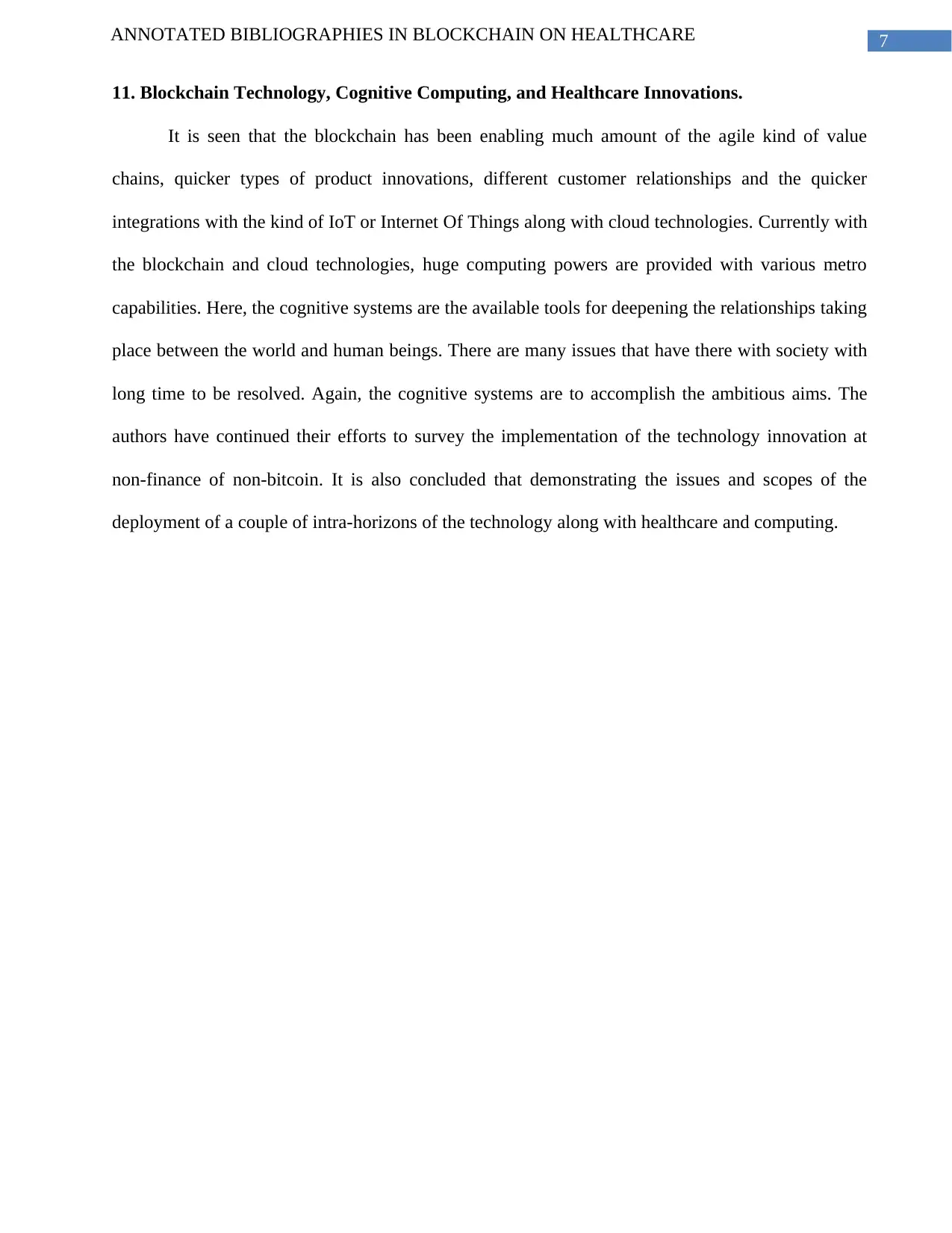
7ANNOTATED BIBLIOGRAPHIES IN BLOCKCHAIN ON HEALTHCARE
11. Blockchain Technology, Cognitive Computing, and Healthcare Innovations.
It is seen that the blockchain has been enabling much amount of the agile kind of value
chains, quicker types of product innovations, different customer relationships and the quicker
integrations with the kind of IoT or Internet Of Things along with cloud technologies. Currently with
the blockchain and cloud technologies, huge computing powers are provided with various metro
capabilities. Here, the cognitive systems are the available tools for deepening the relationships taking
place between the world and human beings. There are many issues that have there with society with
long time to be resolved. Again, the cognitive systems are to accomplish the ambitious aims. The
authors have continued their efforts to survey the implementation of the technology innovation at
non-finance of non-bitcoin. It is also concluded that demonstrating the issues and scopes of the
deployment of a couple of intra-horizons of the technology along with healthcare and computing.
11. Blockchain Technology, Cognitive Computing, and Healthcare Innovations.
It is seen that the blockchain has been enabling much amount of the agile kind of value
chains, quicker types of product innovations, different customer relationships and the quicker
integrations with the kind of IoT or Internet Of Things along with cloud technologies. Currently with
the blockchain and cloud technologies, huge computing powers are provided with various metro
capabilities. Here, the cognitive systems are the available tools for deepening the relationships taking
place between the world and human beings. There are many issues that have there with society with
long time to be resolved. Again, the cognitive systems are to accomplish the ambitious aims. The
authors have continued their efforts to survey the implementation of the technology innovation at
non-finance of non-bitcoin. It is also concluded that demonstrating the issues and scopes of the
deployment of a couple of intra-horizons of the technology along with healthcare and computing.
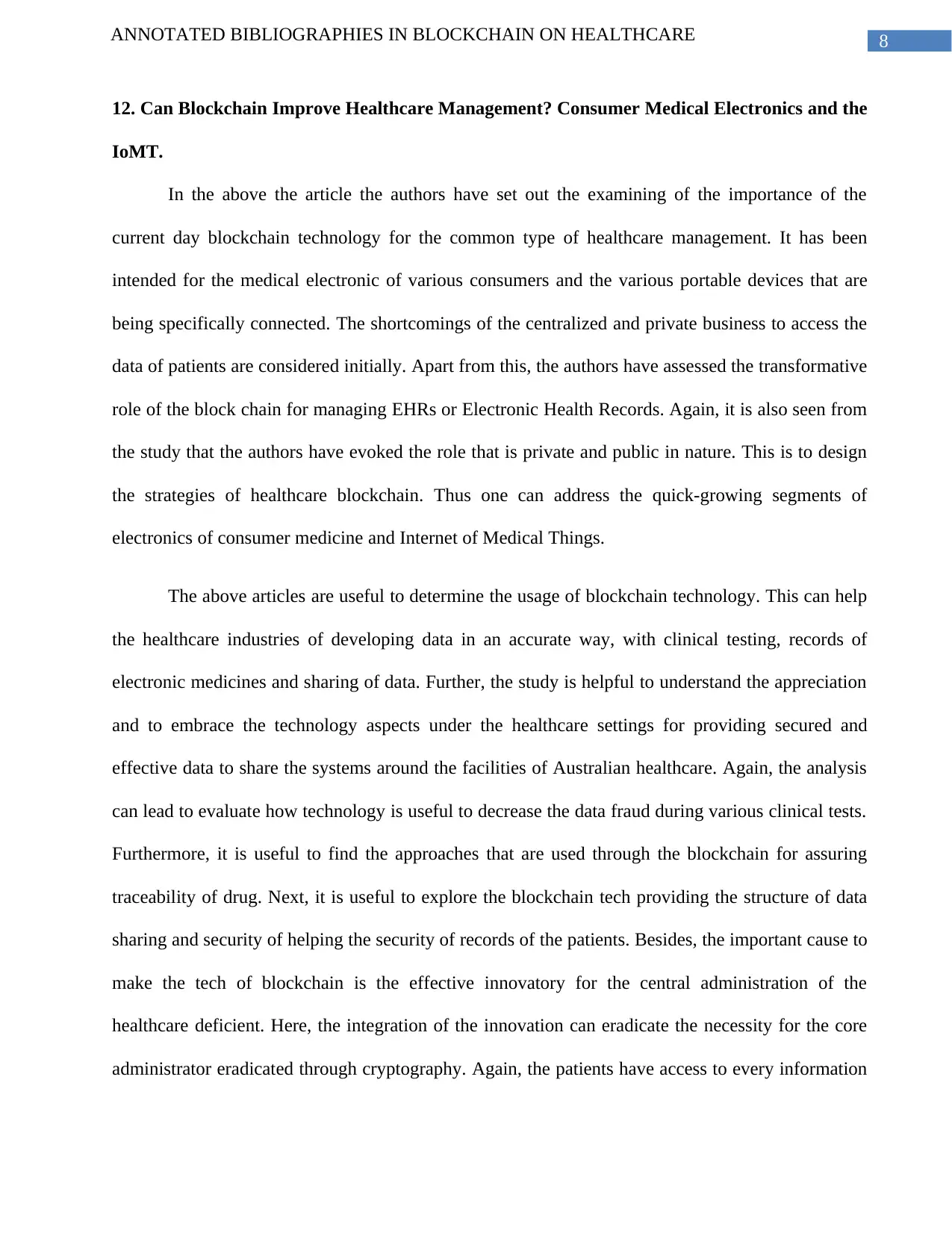
8ANNOTATED BIBLIOGRAPHIES IN BLOCKCHAIN ON HEALTHCARE
12. Can Blockchain Improve Healthcare Management? Consumer Medical Electronics and the
IoMT.
In the above the article the authors have set out the examining of the importance of the
current day blockchain technology for the common type of healthcare management. It has been
intended for the medical electronic of various consumers and the various portable devices that are
being specifically connected. The shortcomings of the centralized and private business to access the
data of patients are considered initially. Apart from this, the authors have assessed the transformative
role of the block chain for managing EHRs or Electronic Health Records. Again, it is also seen from
the study that the authors have evoked the role that is private and public in nature. This is to design
the strategies of healthcare blockchain. Thus one can address the quick-growing segments of
electronics of consumer medicine and Internet of Medical Things.
The above articles are useful to determine the usage of blockchain technology. This can help
the healthcare industries of developing data in an accurate way, with clinical testing, records of
electronic medicines and sharing of data. Further, the study is helpful to understand the appreciation
and to embrace the technology aspects under the healthcare settings for providing secured and
effective data to share the systems around the facilities of Australian healthcare. Again, the analysis
can lead to evaluate how technology is useful to decrease the data fraud during various clinical tests.
Furthermore, it is useful to find the approaches that are used through the blockchain for assuring
traceability of drug. Next, it is useful to explore the blockchain tech providing the structure of data
sharing and security of helping the security of records of the patients. Besides, the important cause to
make the tech of blockchain is the effective innovatory for the central administration of the
healthcare deficient. Here, the integration of the innovation can eradicate the necessity for the core
administrator eradicated through cryptography. Again, the patients have access to every information
12. Can Blockchain Improve Healthcare Management? Consumer Medical Electronics and the
IoMT.
In the above the article the authors have set out the examining of the importance of the
current day blockchain technology for the common type of healthcare management. It has been
intended for the medical electronic of various consumers and the various portable devices that are
being specifically connected. The shortcomings of the centralized and private business to access the
data of patients are considered initially. Apart from this, the authors have assessed the transformative
role of the block chain for managing EHRs or Electronic Health Records. Again, it is also seen from
the study that the authors have evoked the role that is private and public in nature. This is to design
the strategies of healthcare blockchain. Thus one can address the quick-growing segments of
electronics of consumer medicine and Internet of Medical Things.
The above articles are useful to determine the usage of blockchain technology. This can help
the healthcare industries of developing data in an accurate way, with clinical testing, records of
electronic medicines and sharing of data. Further, the study is helpful to understand the appreciation
and to embrace the technology aspects under the healthcare settings for providing secured and
effective data to share the systems around the facilities of Australian healthcare. Again, the analysis
can lead to evaluate how technology is useful to decrease the data fraud during various clinical tests.
Furthermore, it is useful to find the approaches that are used through the blockchain for assuring
traceability of drug. Next, it is useful to explore the blockchain tech providing the structure of data
sharing and security of helping the security of records of the patients. Besides, the important cause to
make the tech of blockchain is the effective innovatory for the central administration of the
healthcare deficient. Here, the integration of the innovation can eradicate the necessity for the core
administrator eradicated through cryptography. Again, the patients have access to every information
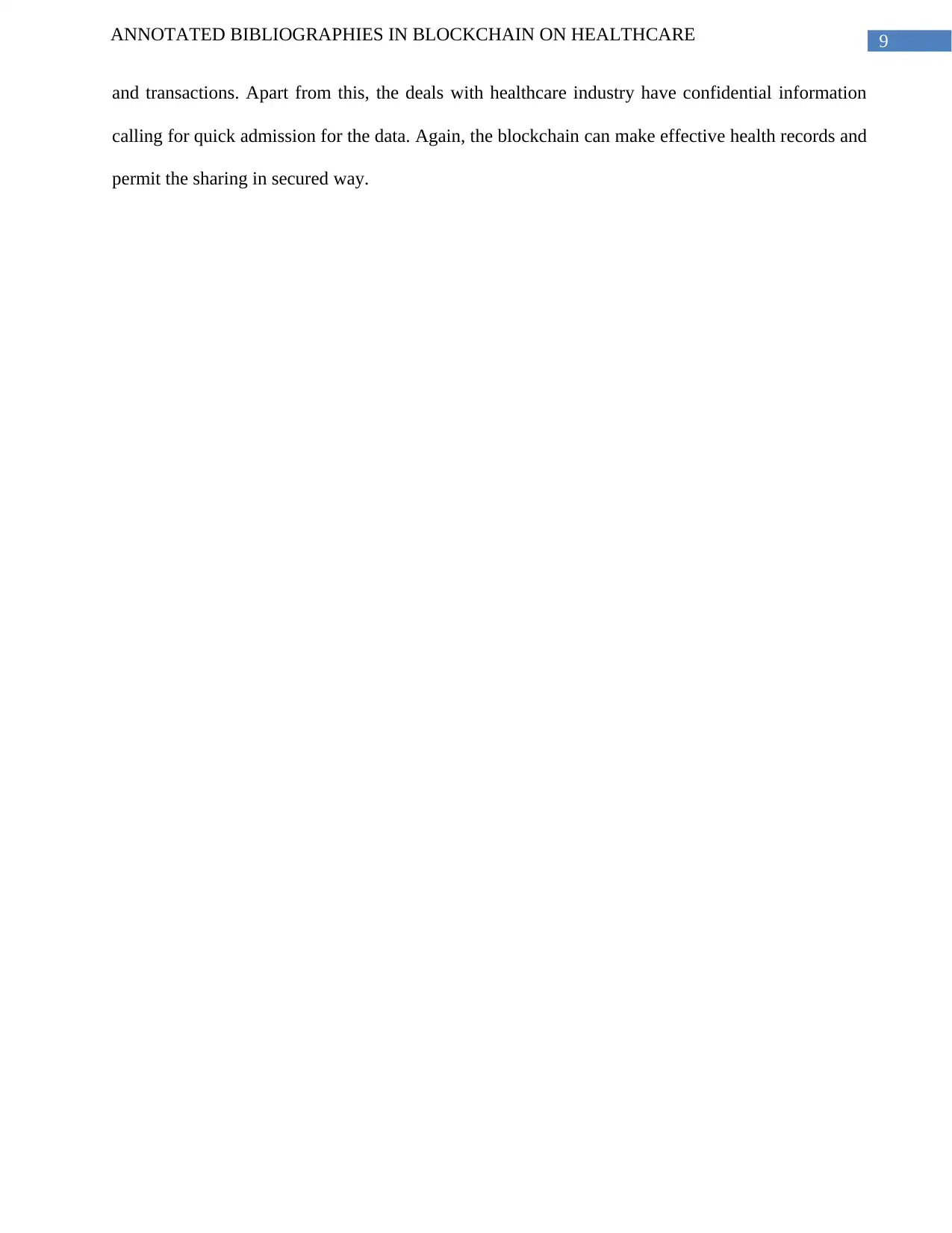
9ANNOTATED BIBLIOGRAPHIES IN BLOCKCHAIN ON HEALTHCARE
and transactions. Apart from this, the deals with healthcare industry have confidential information
calling for quick admission for the data. Again, the blockchain can make effective health records and
permit the sharing in secured way.
and transactions. Apart from this, the deals with healthcare industry have confidential information
calling for quick admission for the data. Again, the blockchain can make effective health records and
permit the sharing in secured way.
Paraphrase This Document
Need a fresh take? Get an instant paraphrase of this document with our AI Paraphraser
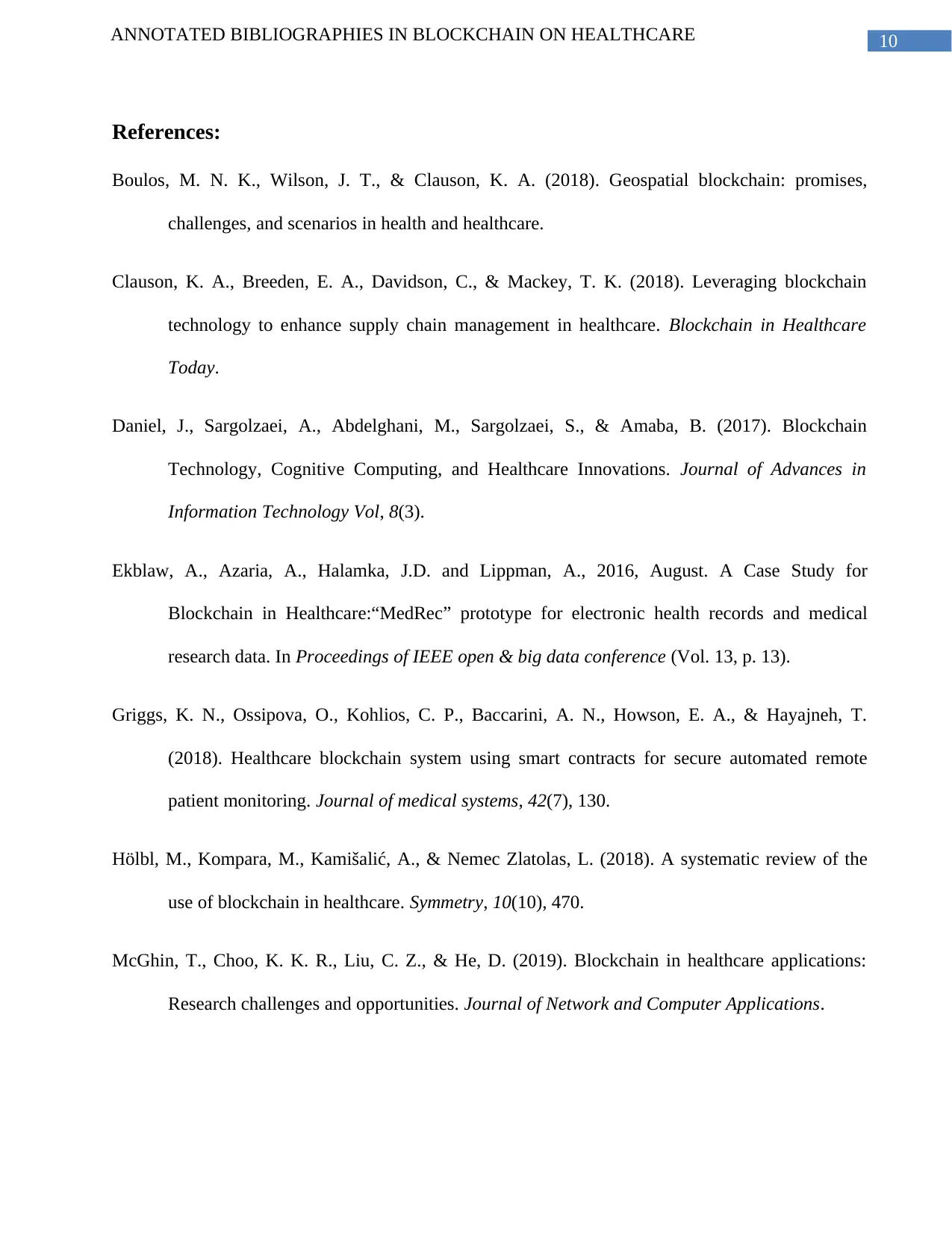
10ANNOTATED BIBLIOGRAPHIES IN BLOCKCHAIN ON HEALTHCARE
References:
Boulos, M. N. K., Wilson, J. T., & Clauson, K. A. (2018). Geospatial blockchain: promises,
challenges, and scenarios in health and healthcare.
Clauson, K. A., Breeden, E. A., Davidson, C., & Mackey, T. K. (2018). Leveraging blockchain
technology to enhance supply chain management in healthcare. Blockchain in Healthcare
Today.
Daniel, J., Sargolzaei, A., Abdelghani, M., Sargolzaei, S., & Amaba, B. (2017). Blockchain
Technology, Cognitive Computing, and Healthcare Innovations. Journal of Advances in
Information Technology Vol, 8(3).
Ekblaw, A., Azaria, A., Halamka, J.D. and Lippman, A., 2016, August. A Case Study for
Blockchain in Healthcare:“MedRec” prototype for electronic health records and medical
research data. In Proceedings of IEEE open & big data conference (Vol. 13, p. 13).
Griggs, K. N., Ossipova, O., Kohlios, C. P., Baccarini, A. N., Howson, E. A., & Hayajneh, T.
(2018). Healthcare blockchain system using smart contracts for secure automated remote
patient monitoring. Journal of medical systems, 42(7), 130.
Hölbl, M., Kompara, M., Kamišalić, A., & Nemec Zlatolas, L. (2018). A systematic review of the
use of blockchain in healthcare. Symmetry, 10(10), 470.
McGhin, T., Choo, K. K. R., Liu, C. Z., & He, D. (2019). Blockchain in healthcare applications:
Research challenges and opportunities. Journal of Network and Computer Applications.
References:
Boulos, M. N. K., Wilson, J. T., & Clauson, K. A. (2018). Geospatial blockchain: promises,
challenges, and scenarios in health and healthcare.
Clauson, K. A., Breeden, E. A., Davidson, C., & Mackey, T. K. (2018). Leveraging blockchain
technology to enhance supply chain management in healthcare. Blockchain in Healthcare
Today.
Daniel, J., Sargolzaei, A., Abdelghani, M., Sargolzaei, S., & Amaba, B. (2017). Blockchain
Technology, Cognitive Computing, and Healthcare Innovations. Journal of Advances in
Information Technology Vol, 8(3).
Ekblaw, A., Azaria, A., Halamka, J.D. and Lippman, A., 2016, August. A Case Study for
Blockchain in Healthcare:“MedRec” prototype for electronic health records and medical
research data. In Proceedings of IEEE open & big data conference (Vol. 13, p. 13).
Griggs, K. N., Ossipova, O., Kohlios, C. P., Baccarini, A. N., Howson, E. A., & Hayajneh, T.
(2018). Healthcare blockchain system using smart contracts for secure automated remote
patient monitoring. Journal of medical systems, 42(7), 130.
Hölbl, M., Kompara, M., Kamišalić, A., & Nemec Zlatolas, L. (2018). A systematic review of the
use of blockchain in healthcare. Symmetry, 10(10), 470.
McGhin, T., Choo, K. K. R., Liu, C. Z., & He, D. (2019). Blockchain in healthcare applications:
Research challenges and opportunities. Journal of Network and Computer Applications.
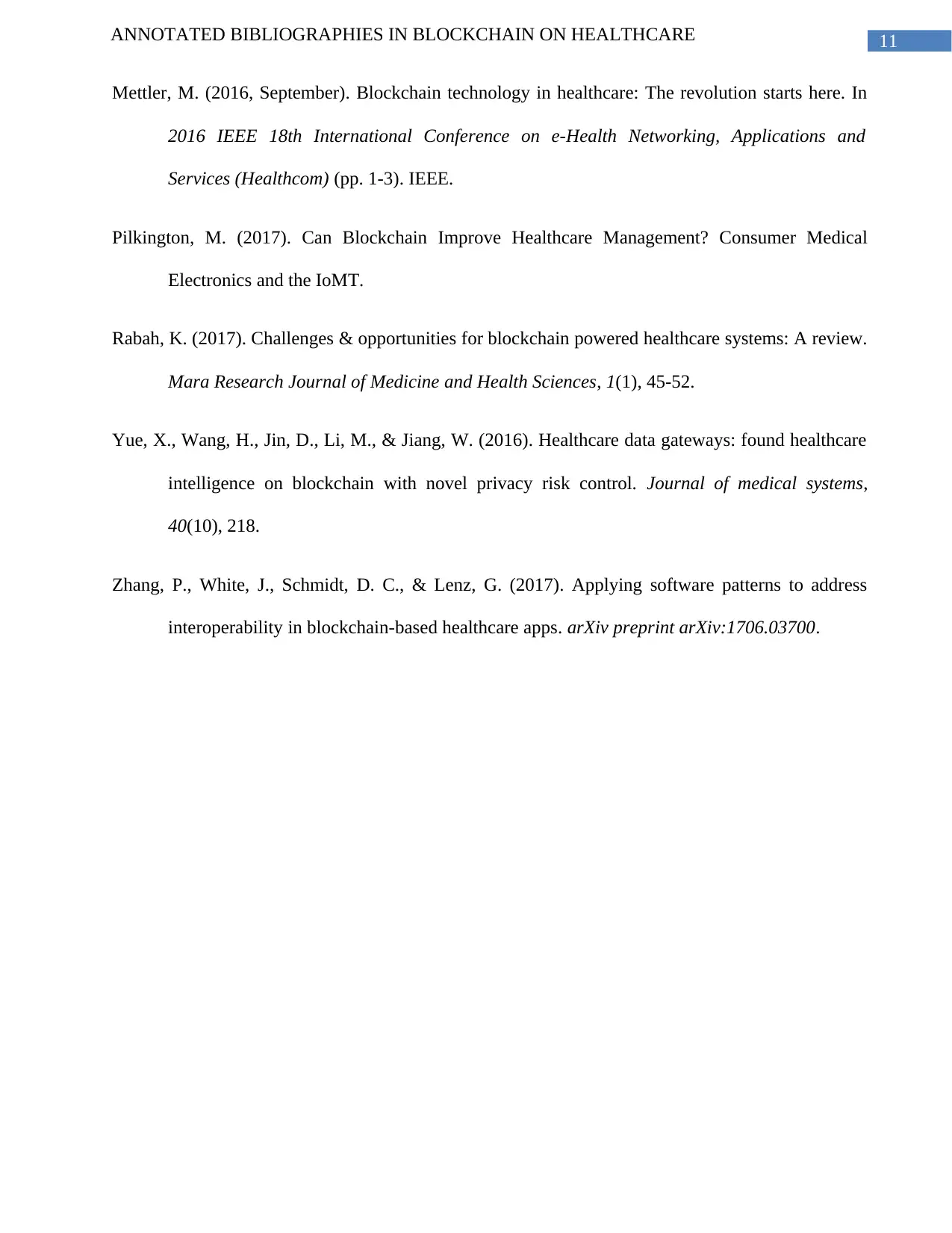
11ANNOTATED BIBLIOGRAPHIES IN BLOCKCHAIN ON HEALTHCARE
Mettler, M. (2016, September). Blockchain technology in healthcare: The revolution starts here. In
2016 IEEE 18th International Conference on e-Health Networking, Applications and
Services (Healthcom) (pp. 1-3). IEEE.
Pilkington, M. (2017). Can Blockchain Improve Healthcare Management? Consumer Medical
Electronics and the IoMT.
Rabah, K. (2017). Challenges & opportunities for blockchain powered healthcare systems: A review.
Mara Research Journal of Medicine and Health Sciences, 1(1), 45-52.
Yue, X., Wang, H., Jin, D., Li, M., & Jiang, W. (2016). Healthcare data gateways: found healthcare
intelligence on blockchain with novel privacy risk control. Journal of medical systems,
40(10), 218.
Zhang, P., White, J., Schmidt, D. C., & Lenz, G. (2017). Applying software patterns to address
interoperability in blockchain-based healthcare apps. arXiv preprint arXiv:1706.03700.
Mettler, M. (2016, September). Blockchain technology in healthcare: The revolution starts here. In
2016 IEEE 18th International Conference on e-Health Networking, Applications and
Services (Healthcom) (pp. 1-3). IEEE.
Pilkington, M. (2017). Can Blockchain Improve Healthcare Management? Consumer Medical
Electronics and the IoMT.
Rabah, K. (2017). Challenges & opportunities for blockchain powered healthcare systems: A review.
Mara Research Journal of Medicine and Health Sciences, 1(1), 45-52.
Yue, X., Wang, H., Jin, D., Li, M., & Jiang, W. (2016). Healthcare data gateways: found healthcare
intelligence on blockchain with novel privacy risk control. Journal of medical systems,
40(10), 218.
Zhang, P., White, J., Schmidt, D. C., & Lenz, G. (2017). Applying software patterns to address
interoperability in blockchain-based healthcare apps. arXiv preprint arXiv:1706.03700.
1 out of 12
Related Documents
Your All-in-One AI-Powered Toolkit for Academic Success.
+13062052269
info@desklib.com
Available 24*7 on WhatsApp / Email
![[object Object]](/_next/static/media/star-bottom.7253800d.svg)
Unlock your academic potential
© 2024 | Zucol Services PVT LTD | All rights reserved.





